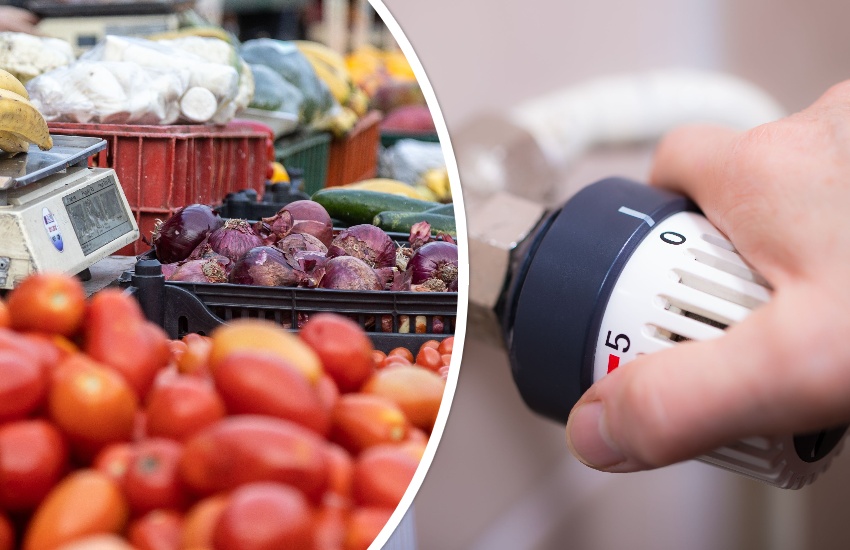


When mum-of-three Chloe returned home from work recently, one of her children, who is six, brought a tear to her eye when he came running up to her and said: "Mum, I want to get a job to help you pay the bills."
Days earlier, after a long walk near the west coast, Chloe had to disappoint her children by denying them ice creams which their friends were enjoying. There was too much week left at the end of the money. Like every week.
Which is also why Chloe and her husband, Luke, will keep the gas switched off at home this winter and why they have run up debts of around £20,000 trying to keep up with years’ worth of everyday costs despite both being in work and frequently using charity shops for clothes and other essentials.
"The worst thing is the worry," Chloe told Express. "I worry constantly about how we’re going to pay for everyday things, especially for the children. Every morning I wake up wondering how we’re going to pay for things our family need that day.
"We're very grateful for the help we get. You know there are always people worse off than you. But it would be a relief not to have to worry all the time about where the next few pounds are coming from."

Pictured: Chloe often worries about money and how to meet rent, food costs, debt repayments and other essential expenditure.
The couple’s four school-age children – including two from previous relationships – are among more than 100 children growing up in families whose weekly income from all sources, including work and benefits, falls well short of what they require to avoid an intolerable standard of living.
This is because of something called the benefit limitation, a little-known but pernicious feature of the island’s social welfare rules which for decades has kept many of the poorest large families – and goodness knows how many children – in conditions of unsparing hardship.
It works like this. The States study the price of essential goods to determine a household’s minimum financial need. The larger the family, the greater the need. Where household income falls short of that need, the States pay income support to make up the difference.
But recipients of income support face an arbitrary cap – the benefit limitation – on their income from work and benefits. For around two dozen larger households, minimum financial need exceeds the benefit limitation, and therefore their income support is cut off below their minimum need. Many are like Chloe and Luke: mum or dad or both employed and working hard to look after multiple children.
The last time Chloe and Luke looked at the figures, the benefit limitation was capping their total income from work and income support around £140 a week – or £600 a month – below their minimum need to avoid the States’ definition of an intolerable standard of living.

Pictured: Chloe said that visiting children's play centres like Oaty and Joey's and other local attractions is normally beyond their weekly budget. Credit: Visit Guernsey.
The couple’s youngest children are twins. "We’ve got their birthday coming up soon, but we can’t afford to do anything like a birthday party," said Chloe. "If the kids wanted to go to Oaty and Joey’s, we can’t afford to do little things like that.
"The children understand that we haven’t got a lot of money. We try to explain to them, without worrying them obviously. It’s difficult at times when their friends have this and that and we have to say we can’t afford those things. When the children do get stuff, they really appreciate it.
"You do your best for your children, but once you’ve got no money left you’ve got no money left. Yes, that causes worry and stress, but you kind of get used to it. As long as my children are healthy with a roof over their heads and food in their bellies…they are the main things for us. Yes, sometimes they have to walk around with holes in their trainers.
"This past year has felt like the worst by far for struggling. You get yourself in a rut. You’re struggling to make ends meet every month. Then you think about buying Christmas presents for the kids, which requires loans to be taken out."
The cost of living locally is increasing faster than at any time for 30 years. The prices of some essential goods are rising well above the published rate of inflation of 8%. Even households better off than Chloe and Luke are feeling the squeeze on food and fuel in particular.

Pictured: The family's tight budget has been under more pressure since the cost of food started increasing significantly and this winter they do not expect to have enough money to use their gas heating.
"Gas is extortionate," said Chloe. "They are asking for £250 a month for gas. I’ve told them I just can’t pay that. I can’t give them what I haven’t got. I have said I can pay £100 a month.
"I’m just not going to use gas heating this year. We’ll use the coal fire and we’ve got some little heaters we can use in bedrooms. I’ve asked [the landlord] if the gas could be replaced with electric, but it would cost about £6,000 and it’s too expensive for them, which I can understand.
"The cost of food is huge now. We budget for food very carefully but there are six of us. I’m going through about £300 a week on food and that is with budgeting carefully. I have to say no to a lot of food in the shops. Sometimes it feels like all our money is going on food. A little bit more money for food, even if it was food vouchers, would be a huge help to us."
Food costs the couple around 50% of their income after they have paid the States rent of nearly £400 a week. "We really appreciate the house we rent from the States," said Chloe. Until recently, debt repayments were taking out another £130 a week, now reduced to £80 a week after consolidating various loans. Putting away savings is unthinkable.
Chloe rarely buys new clothes. When she does, they tend to be off catalogues which allow the cost to be spread over months or years. Otherwise, she relies on local charities and gifts from family and friends.
"Charity shops are really good for clothes. A lot of people would be surprised what you can pick up at charity shops. Some of the girls at work give me clothes, which is nice of them. Family helps out now and then, especially at Christmas, when I normally ask for clothes and shoes as gifts." The States pay for the children’s school uniform. "We’re very lucky we get a uniform grant. We appreciate that a lot," said Chloe.

Pictured: Chloe makes frequent use of the island's charity shops, especially when she needs clothes.
Chloe and Luke are in their late 20s. They met a decade ago. Each of them had a young child from a previous relationship. They rented a private flat in Town. They were never well off, but Chloe recalls those days as "a bit easier financially". Luke was working full time and Chloe was doing a training course.
Two episodes of serious ill health either side of an unplanned pregnancy changed their circumstances.
First, a close family member suffered a life-threatening condition. Chloe became heavily involved in his recovery and it also affected Luke’s employment and income. Eventually, Luke returned to work full time and Chloe secured an apprenticeship.
Then, nearly seven years ago, Chloe fell pregnant. "I’d been at work for about two-and-a-half years by this point," she said. "I went for my scan and they told me it was twins. I kind of broke down with worry about how we would do it with two more children at once. Luke was reassuring and said we’d get through it.
"I had to take about eight months off work. At five months, I was sent to Southampton because of problems with the pregnancy. The twins were delivered two months early and were very small when they were born. That led to me taking more time off work than I planned."
When the twins were toddlers, Luke suddenly suffered a stroke. "The doctors were really shocked because he was young, physically fit, not a drinker or smoker," said Chloe. 18 months later, he had another stroke and this time required extensive surgery, which inevitably had a significant impact on the couple’s income over an extended period.
Fortunately, Luke has now returned to good health. Chloe is working full time in a settled career which she enjoys. Together, they work around 60 hours a week, though not in high-paid jobs. Chloe receives no holiday pay and, despite the best efforts of family to assist, during school holidays she sometimes has to forego earnings.

Pictured: Many households claiming income support and affected by the benefit limitation contain adults in employment and working hard trying to improve their family's circumstances.
It saddens Chloe that there remains so much prejudice and so many myths attached to income support, previously supplementary benefit.
"There’s such stigma about people on benefits being lazy but in most cases it’s not like that. Most of us on benefits are trying our best financially and in other ways. We’re doing our best to provide for our families. Most of the people I know who live on our estate are working. It’s not right to think that everyone on benefits is being lazy and not working.
"I work because I love my job and it brings in income and it keeps me sane. Yes, I could go to the doctor, say I’m badly depressed, get signed off and probably get exactly the same income as I’m getting now. I don’t want to do that and I’m not going to do that, but this whole thing with the benefit limitation doesn’t make sense."

Pictured: Deputy Peter Roffey, President of the Committee for Employment & Social Security, hopes to complete the moves started by his predecessors towards increasing and then eliminating the benefit limitation.
Chloe does not follow local politics closely, but she knows the importance of today in the States. Deputies are debating a proposal from the Committee for Employment & Social Security to scrap the benefit limitation. If they agree, Chloe, Luke, their children and dozens of others will soon no longer suffer an arbitrary cap on their income. If they earn more at work, they will keep it without losing the same amount in income support. For the first time since the birth of their twins, they will receive the income they need to lift themselves up to the minimum standard of living considered acceptable in an affluent, compassionate, civilised community.
The proposed removal of the benefit limitation will be led in the States by the Committee’s President, Deputy Peter Roffey.
"Removing the limit of weekly income is a crucial step in aiding some of Guernsey’s most vulnerable families, particularly children," said Deputy Roffey.
"It is unjustifiable that a limit of income is applied to low-income households which often forces them to make impossible choices when paying for the most basic day-to-day necessities like food or utility bills. The Committee is of the opinion that continuing to impose this would only serve to create severe financial hardship for some Guernsey families."

Pictured: Chloe and Luke are hoping that they will soon be able to celebrate the removal of the benefit limitation which arbitrarily restricts their income and leaves them well short of their assessed financial need every week.
Chloe has spent so long worried and despondent that when I tell her there is a good chance the States will indeed scrap the benefit limitation she at first seems disbelieving and then visibly moved.
"That would make a massive difference. We’ve been stuck in this situation for such a long time. We dread the next bill arriving. We have nothing left over, ever.
"We’re trying to say to the States: please help. I’d love to believe they will remove the cap. I just hope they do. We would have a bit more breathing space with food bills. Maybe we could even take the kids out for lunch as a treat."
Note: Names have been changed to protect the identity of the family interviewed.
Benefits boost for poorest families
Comments
Comments on this story express the views of the commentator only, not Bailiwick Publishing. We are unable to guarantee the accuracy of any of those comments.